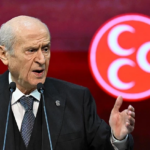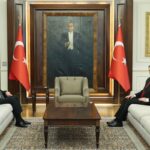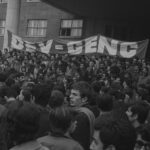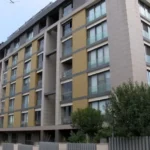
PATRONUMUZ OL
Adam McConnel
Is Turkey industrializing? A personal perspective
Many of Turkey’s Kemalist elites remain adamant that the governing AKP is cooking the numbers, that the economy is not growing, that exports are not growing, that somewhere somehow it’s all a big sham. They pooh-pooh the state statistics, claiming that the numbers are fake and intended to fool the ignorant masses into voting for the governing party.
Back in 2001: The NYT on the AKP and Erdoğan
There is this fabrication that for its first six or eight years the AKP was benevoılently regarded by the West. In fact, at no time since the AKP’s founding in 2001 did the domestic or international opposition press approach the party or Tayyip Erdoğan in a positive way.
Schadenfreude sharks
The AKP is by far the largest and most important force in Turkish political life. But the very nature of the AKP’s size, and the total lack of alternatives for Turkish citizens who have serious, thoughtful criticisms to voice, have long created a space in Turkish political life waiting to be filled by a new political organization, most likely of a centrist outlook.
How to define the Turkish Youth Union (3)
Over the last twenty-five years, not a single Turkish “leftist” party has attempted to overtly and definitively reject nationalism. Atatürkism’s “Six Arrows” still maintain their hold on even the Turkish left and, consequently, Turkey continues to lack or to wait for a genuinely leftist political party.
How to define the Turkish Youth Union (2)
How could an “ultra-right” group have taken part in the Gezi protests? The answer has three aspects. The first is that the TGB is not actually “ultra-right” as Westerners understand the term.
How to define the Turkish Youth Union (1)
When Turkey’s political system was opened to all political ideologies in the 1960s, there were elements from the Republic’s early years that leftists could latch onto in order to provide appropriate Kemalist coloring for their own political rhetoric. Furthermore, the brand of Marxism-Leninism which became more popular in a still largely agricultural Turkey during the 1960s and 70s was not the relatively staid Soviet Stalinist interpretation, but rather varieties of Maoist revolutionism, peasantism and Third Worldism. In sum, nationalism with an anti-imperialist twist (or perhaps disguised as anti-imperialism) has always been a key element of Turkish leftist discourse.
Deconstructing Atatürk’s personality cult: A response to Steven Cook (3)
The “never hegemonic” phrase Cook uses in reference to the unpopularity of Atatürk’s reforms is a severe understatement. The main way in which Atatürk was “stunningly successful” was in maintaining oppressive control over a country while instituting radical social reform projects that the vast majority of the citizens inwardly opposed. The short-lived Progressive Republican Party of 1925 owed its meteoric rise (as well as its abrupt termination) to the massive popular displeasure with Mustafa Kemal’s reforms. So did the Free Republican Party of 1930.
Deconstructing Atatürk’s personality cult: A response to Steven Cook (2)
Kemalist elites in the state bureaucracy and the military always held sway (or exercised tutelage) over Turkish state institutions -- until about ten years ago. Those same Kemalist state elites, were also the instigators of oppressive policies towards Turkey’s Kurdish population (and indeed all non-Turkish, non-Muslim “minorities”). The AKP, on the other hand, comes from a different political tradition, which is why, starting more than a decade ago, they have been able to start positively and directly addressing Turkey’s Kurdish citizens.
Deconstructing Atatürk’s personality cult: A response to Steven Cook (1)
The CUP leaders were motivated by a toxic brew of radical European ideologies transferred to Ottoman society through two or three channels. They comprised: Comtean Positivism; Ludwig Büchner’s “scientific materialism”; Social Darwinism; Gustave Le Bon’s elitist, anti-democratic, manipulative mass sociology; Colmar von der Goltz’s German socio-militarism, which essentially envisioned a society as a large army -- all on top of a bedrock of (Turkish) nationalism.
Michael Rubin, and bipartisan hate speech against the AKP
In order for the U.S. right to embrace Rubin’s perspective, they’ve had to forget important precepts of post-WWII U.S. foreign policy. Turkey under the AKP is a staunch NATO ally, and the most important force for democracy in the region. The AKP is also devoted to developing Turkey’s market economy, and an advocate of free trade. Remarkably, these items have been brushed aside by those taking up Rubin’s anti-AKP stance.
Further adventures in the NYT’s Turkish coverage (2)
Yeğinsu and the NYT are toeing the same line as all the accusations that have recently been aimed at the Turkish security forces for supposedly killing “hundreds” of civilians during the ongoing violence. While the vast majority of alleged “civilians” killed by the security forces are PKK fighters, the same PKK then tells human rights watchdogs that the casualties they suffered were actually “civilians,” which is then repeated by such international observers who, unfortunately, have repeatedly shown themselves more willing to believe violent leftist militants than the Turkish government.
Further adventures in the NYT’s Turkish coverage (1)
Preferring the term “Kurdish fighters” instead of the name of their militant organization is an attempt to skirt the fact that these guerillas should be identified not by their ethnicity but by their ideology.
The NYT tries a new approach to criticize Turkey
Individuals and the general public in Western Europe and North America, generally on the left side of the political spectrum, need to lose their romantic attachment to violent Kurdish militancy as soon as possible.
The rise and fall of Selahattin Demirtaş (2)*
Possibly the U.S. government has woken up to the real face of the HDP. At the beginning of December, Demirtaş was in Washington D.C. to speak at a conference organized by the Middle East Institute. While he was there, he took the opportunity to complain to the press about the “imperialists” meddling in the Middle East, which he named as the U.S. and Russia.
The rise and fall of Selahattin Demirtaş (1)
Demirtaş, for his part, has engaged in increasingly militant rhetoric since, and has refused to distance the HDP from the PKK’s violence; if anything, he has more and more identified with that violence.
Context and interpretation in press coverage of Turkey (4) Infrastructure and innovation yet again
If Turkish environmentalists’ reaction to the AKP’s infrastructure projects had been based solely on genuinely environmental arguments, those activists might have received more support, but it was always clear -- and Turkish citizens understood it as such -- that the opposition to all these projects was largely political. Stopping and blocking the AKP wherever it might turn clearly took priority over the environment.
Context and interpretation in press coverage of Turkey (3) Infrastructure and innovation
The third bridge across the Bosphorus, the bridge across the Sea of Marmara’s eastern end, the massive new Istanbul airport, the new sea transport canal project envisioned for Turkish Thrace, and the expansion of conventional and high-speed rail transport across the country, are only some examples of projects either planned or already under way (and interestingly, the anti-AKP opposition is also opposed to all of them).
Context and interpretation in press coverage of Turkey (2)
Recent polls suggest that popular support for the HDP has withered, and some prominent Turkish political commentators, who threw in their cause with the HDP for the past year in a short-term, last-ditch effort to defeat the AKP, have begun to hop off of the bandwagon. Little by little, the realization that the PKK’s leadership in the Qandil Mountains never intended to make peace, and that the current violence was the PKK’s choice, is seeping into even the most anti-AKP circles. Eventually even the NYT will have to accept this assessment.
Context and interpretation in press coverage of Turkey (1)
Ceylan Yeğinsu conceals the situation’s current and historical context from the reader. This goes beyond not mentioning the fact that the continuing violence was openly initiated last summer by the PKK, and consists of an attempt to take, by force of arms, chunks of territory from the Turkish state. Yeğinsu does not want readers to know facts that might lead them to a conclusion other than the one she intends.
How committed is the German Marshall Fund to a Turkey-EU partnership?
Compounding matters, and as was the case in the Ümit Cizre article in MERIP, not once does Alessandri mention Fethullah Gülen’s name in this article. For Alessandri, neither does the PKK bear any culpability for the heightened intensity of the conflict between that militant organization and the Turkish state.
Ümit Cizre and the reality of Turkish politics (2)
It is a cult that has become rich, powerful, and multi-national. It is also emphatically non-transparent. It is like an iceberg showing only one-tenth of its mass above the waterline. And below the surface, it resembles a labyrinthine secret society or illegal organization without however any incriminating conspiratorial documents about seizing political power. But power is what they are most after. And Cizre’s failure to even mention them leads to some very serious questions about the underlying bias in her approach to Turkish politics.
Ümit Cizre and the reality of Turkish Politics (I)
If she means that the DP in the 1950s, then the AP in the 1960s and again in the 70s, “deviated from their original programs and became out of touch with reality,” and that now, it is the AKP that is doing so, this becomes nothing but playing with very inflammable material indeed, implying that a similar fate (like 1960, 1971 or 1980) might be in store for the AK Party.
The eternally falling sky over the Turkish economy
Even though I sometimes criticize specific NYT journalists for what they write about Turkey, fundamentally the fault lies with the paper’s editors. It is they who have chosen to take sides in Turkey’s domestic politics, in what is nothing more than a fit of imperial pique with overtones of bigotry and orientalism.
Turkish-American relations at the “End of Reform”
Even at that point (in 1952), the Islamic Threat was front-and-center in Lewis Thomas’s consideration of Turkish society. What was there for Thomas to be so concerned about?
Fulfilling the conditions for cultural interpretation
The inability of foreign journalists to explain Turkish events to their readers has resulted in the creation of a “alternate Turkey” in which white is black and day is night. The political opposition in Turkey, both the Kemalist elites and the Gülenists, have aided and abetted this willful misrepresentation of Turkey to the world.
The “prior circumstances” of U.S. research on Turkey
When the direct voice of Turkish society has emerged, especially in politics (the Democrat Party, Turgut Özal and the ANAP of the 1980s, now the AKP) but also in art (the arabesk musical style), observers both foreign and domestic, instead of trying to understand, have generally ended up condemning various aspects of a phenomenon that they clearly did not accept or comprehend.
Knowledge, power, and the Turkish Republic
Instead of objectively reporting the context for the AKP’s attempts to renew, rearrange, and impose transparency on state institutions, the Western press has engaged in an increasingly shrill and hysterical campaign against it. Instead of providing reasoned, constructive criticism, an all-out, nearly unanimous campaign to demonize Tayyip Erdoğan and the AKP has been initiated.
Interpreting the Turkish Republic
Local journalists fluent in English (or French) come from the elites of those societies. This means that, because local elites have often obtained an education that separates them from, and which even inculcates certain class-based prejudices toward their own society, their reporting will often share the same weaknesses, even the chauvinism, that directly foreign reporting has displayed in the past.
Covering Turkey
Not until the 1970s would U.S. academics emerge who were writing on Turkey or Turkish-U.S. issues without any official ties. Even today, when the Turkish Republic does attract attention in the U.S. media, the commentary is abysmal, poorly informed or indeed disinformed, and often bigoted.
The PKK in 1Q84
But this is the real world, there is no doubt about that. The pain one feels in this world is real pain. Deaths caused in this world are real deaths. Blood shed in this world is real blood. This is no imitation world, no imaginary world, no metaphysical world. I guarantee you that. But this is not the 1984 you know…. No, this is no parallel world. You don’t have 1984 over there and 1Q84 branching off over here and the two worlds running along parallel tracks. The year 1984 no longer exists anywhere. For you and for me, the only time that exists anymore is this year of 1Q84. (1)
EN SON HABERLER










